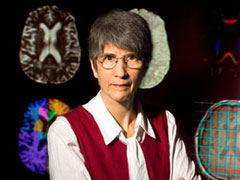Thinking Ahead
By Jim Oldfield
Dr. Sandra Black, a senior scientist and director of the neurosciences research program at Sunnybrook Research Institute (SRI), has been talking about neurosciences without pause for 35 minutes. “You can survive a heart attack, you can survive cancer, but if you’re going to dement—” She stops. Air blowing through the ductwork is the only sound in the blind-drawn, fourth-floor conference room near Black’s A wing office. She continues quietly, “It’s not so great.”
Loss of independence due to cognitive decay is a drawn-out, devastating experience. That is one reason why Black, though appreciative of the importance of treatments for cancer, heart disease and other disorders, is passionate about neurosciences. “After all, the ultimate goal of successful treatment of our body ailments is, in a sense, to keep our brain healthy. If you’ve got a brain that’s failing, I don’t care how good your body is; you’re not going to be happy."
As the population ages—20% of Canadians will be over 65 by 2020; over-90 is the fastest growing age group—diseases associated with aging are becoming a critical concern for individuals, their families and the health care system. A person’s risk for dementia doubles each decade after 65, and by age 95, nearly 50% of the “lucky” survivors will have it. Neuroscientists, including Black, the inaugural holder of the Deborah Ivy Christiani Brill Chair in Neurology at the University of Toronto, have made great progress in understanding neurological disease. But if the neurosciences research program is to have the global impact Black envisions, then, she says, “We need more.”
One promising area of investigation Black would like to see come to fruition is the relationship between dementia and amyloid, an abnormal protein deposited in the brain as Alzheimer’s disease progresses. Black is co-leading a clinical trial of a drug to reduce production of this protein, and is hopeful the treatment may modify the course of the disease, going beyond existing cholinergic agents, which don’t alter disease progression. Recent advances in positron emission tomography have allowed researchers to visualize amyloid deposits, opening a new window into understanding dementia. It is this kind of technology that Sunnybrook needs to take the neurosciences research program to a new level, says Black.
Funding—$13 million over five years starting in 2002 and with $25 million in new funds soon to be available through further fundraising by the Heart and Stroke Foundation (HSF)—is enabling the HSF Centre for Stroke Recovery, for which Black is the Sunnybrook lead, to excel at the kind of research and care Black envisions for the neurosciences. The centre, a partnership among Sunnybrook, Rotman Research Institute, Ottawa Health Research Institute and the HSF of Ontario, offers what Black calls a “boutique” approach to care, tailored to each patient. Imaging experts, motor physiologists, research physiotherapists and neuroscientists work together to understand how to optimize recovery for patients. But even stroke recovery is affected by how much patients can contribute cognitively to their rehabilitation—another motivation to strengthen the neurosciences research program.
Effective neurosciences research and the best care can be complementary, especially when juxtaposed in the same space, and that is a model Black will strive to take further. Clinician-investigators earn the privilege of doing research on people through the medium of the care that patients receive; patients offer their trust when those researchers and their staff give the best care available. Sometimes, as with clinical trials for new drugs, that care is unavailable anywhere else. “It’s research embedded in care,” says Black. “It creates a kind of partnership with the patient, and they help us create the care of tomorrow.”
Black's amyloid-lowering clinical trial for Alzheimer's disease is sponsored by Myriad Pharmaceuticals. The HSF Centre for Stroke Recovery is funded by the HSF of Ontario, with matched dollars from Sunnybrook, the Ottawa Health Research Institute, and Baycrest's Rotman Research Institute and Kunin-Lunenfeld Applied Research Unit.
Jim Oldfield is the communications coordinator for Sunnybrook Research Institute’s special projects office.
PDF / View full media release »





